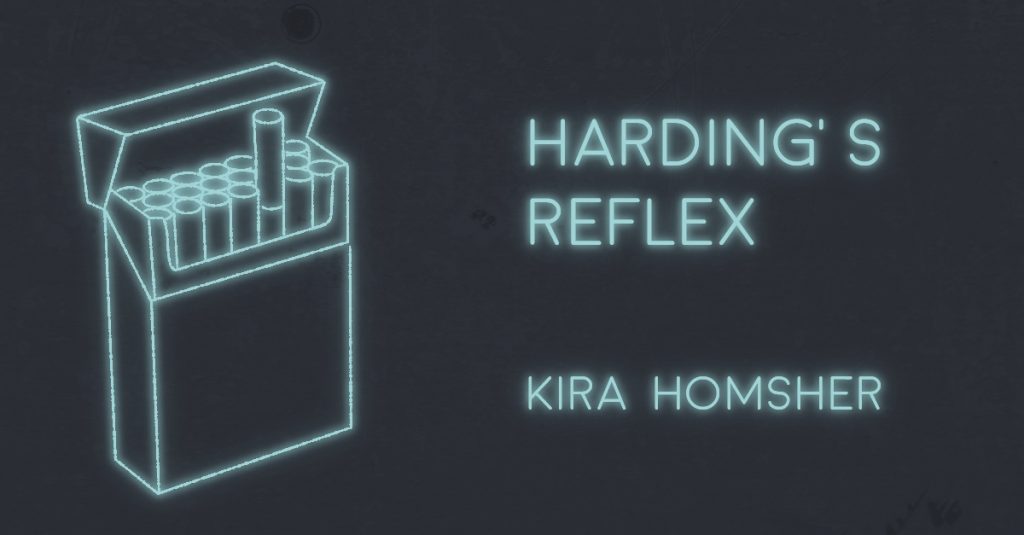It’s an involuntary reflex, like how looking at the sun can make some people sneeze. Whenever Harding drives past a 7-Eleven, he has to turn around and buy a pack of cigarettes. To be clear, he is not a smoker. He buys a cheap pack of whatever color looks most appealing in the moment, regardless of brand, then smokes exactly one cigarette in the parking lot before stuffing the pack in the glove compartment and driving to his destination.
He particularly likes packs in yellow. And sea-foam green, because they look clean and soapy.
If he had to explain it, he’d pin it on the parking lots. There’s something about the 7-Eleven parking lots that makes him want to pause and tether himself to the landscape. But Harding is not a teenager anymore and needs an excuse to loiter. Cigarettes are the obvious choice, because they give him the appearance of having a habit.
Harding is not a man of habits and this makes him very difficult to latch onto and describe. A man should have one or two habits so that he can be known by them. A man could play poker or refurbish guitars. A man could take evening walks around the neighborhood. A man could stretch, habitually.
But Harding is not a man of habits, and so he must simulate them. How does a man pass his days without habits? That’s for him to know.
Today, Harding is smoking blue. Because they were out of seafoam and yellow.
He was on his way to visit his sister when he saw the 7-Eleven sign and had to pull over. His sister is dying a slow and discerning death. The nearness of her death has given her an uncanny sweetness; her words are full of import. Harding does not like to be around it. It makes him feel threadbare and immaterial. She has always been more substantial than he.
Harding has many dreams for a man with no habits. Last night he dreamt the world was a campground and everyone he knew lived next to each other in little tents, each zipped up and doing important research on screens that glowed and buzzed. Having nothing to research, he passed from tent to tent, making sad little visits of himself.
One tent had a lava lamp inside. Another had a baby and some posters. When he woke, Harding tried but could not remember the images on the posters. Those sorts of things never make it out of dreams.
Harding is smoking blue, halfway to his dying sister and her menacing wisdom. He tries taking deep yogic breaths through the cigarette, then looks down at the shrinking butt between his fingers, a wet heat settling beneath the skin around his eyes. He drops it, steps on it, returns to his car. It takes him 17 minutes to arrive at the house where his sister is dying.
Her room is full of flowers Harding can’t identify. She’s propped up in bed, wearing an expression he refuses to identify.
Harding attempts conversation:
—What are you dying of again?
She smiles the infuriatingly patient smile of the near-death.
—5G.
—Be reasonable.
—All right. An infection, then.
—Right. What do you want done with the, with your body?
—Cremation, please. It’s all written down somewhere. Did you know that the cremation chamber is called a retort?
She laughs at her own remark. Harding tries not to cling to the sound of her laughter. Her cheerfulness is an insult. It’s easy to laugh when the burdens of life and loss have turned to vapor.
—What will you do when I’m all gone?
Harding considers telling her about his dream; the lava lamp, the baby. This is his final offering.
—I hadn’t really thought about it. I had this dream…
She interrupts.
—I still remember our first phone number.
—It had too many zeros.
They agree about the zeros. His sister looks tired now, and possibly a little bored. Healthy people never imagine their dying words will be wasted in this way, tossed absently about without catching on anything. Her breaths grow shallow and dissembled. Harding stares at his boots and contemplates his dream, passing in his mind from tent to tent, never bothering to zip them up again when he departs.
Of his sister, his last referent on earth, he has made another sad little visit. Maybe it is rude to inflict your dreams on a dying person; maybe they are supposed to become the dream. He takes her hand in his and administers the lightest pressure. She squeezes back. And just like that, Harding zips his sister closed.

